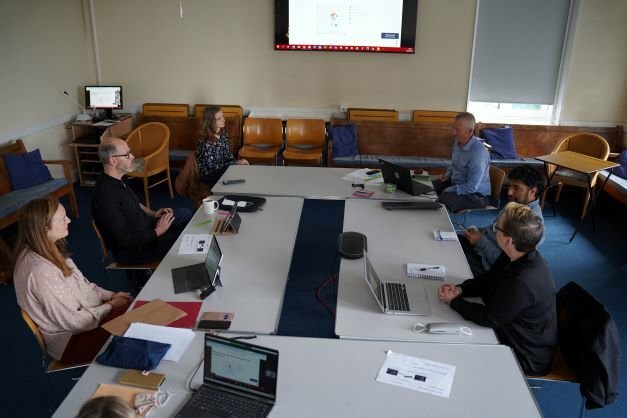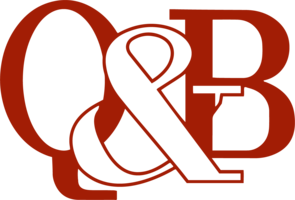
A hybrid meeting at PlaceWorks
by Duncan Wallace - speaker at the Annual Q&B Conference, November 2022
Quakers have a good track record on running good meetings but we can advance still further by harnessing the power of the Quaker Business Method and combining it with Hybrid Meeting technology - producing truly exceptional meetings that advance equality, simplicity and sustainability.
Quaker Meetings are what have held together the social action movement for over 400 years. During that time we have stood up against states, conscientiously objecting with such power and authority that we have helped key turning points in history. Quakers have a reputation of being at the forefront of some significant changes in British history such as the abolition of slavery or in the last decade the marrying of people who are not heterosexual. Many of us are involved in organisations like Extinction Rebellion.
On the inside of Quakerism, like any organisation we have a system of meetings that give us this strength to act with conviction, knowing that we are acting in the Spirit that has been tested and discerned collectively. So we have meetings for business, which are also held in an atmosphere of worship - often referred to as the Quaker Business Method. We also have meetings for threshing and meetings for clearness. These can help us resolve disputes and look humbly into the difficult areas of our work and lives. In our book, ‘Quaker Faith and Practice’, which is updated regularly, we write about the systems and the processes that help us do our work in the tradition that we have learned works well.
Quakers are renowned for setting up all types of successful businesses. Our business meeting practices, as peoples of faith, are world class in being really good business decision making. The Quaker Business Method was going for 400 years before hybrid meetings and when I think back to the many successful Quaker -founded businesses, such as Cadburys, Rowntrees, Sainsbury’s, Lloyds Bank and TSB, Clarks Shoes and Carr’s biscuits in Scotland I would suggest that they would have used the method in their time.
Across our history, as Peoples of faith, we have found that there are some core statements that find their way through all of our discernment. Over 400 years of Quakers these have been continually settled down to what is known as ‘testimonies’. In this article, I'll explain how the testimonies map across to good practice of Quaker business values in hybrid meetings.
Equality and hybrid meetings
We offer hybrid meetings to help include those that don't wish to or cannot be at the physical meeting room. We may travel into the office and physically be at the meeting or the right ordering of our lives may require us not to travel into the office on that occasion, but to join remotely. Equality in this case is the principle of inclusion, as experienced by being an equal participant, whichever way one participates. The responsibility of the meeting organisers is to plan for that inclusion.
There are some important examples of this in our Quaker Meetings where we make complex business decisions. One such example in our way of organising ourselves regionally is known as Area Meetings. Area Meeting is the organising structure that joins up the different local Quaker meetings to organise our decision making. We share our decision making in this way so that we can organise powerful actions such as the protesting I referred to earlier in the article. We also share our decision-making so that we can support ourselves with finance for our work, appointing volunteers to jobs that need to be done and to share community news like deaths, marriages, births and updates on our work.
A Quaker Area Meeting or National Meeting can be held across many locations.
For example - where I live In South East Scotland you have the very rural area of Dumfries and Galloway and very urban area of Edinburgh all in one geographically large Area Meeting. Some of the travel times across the area can be 2 hours each way. We don’t always have great transport options. We also don’t always have great physical health, some of our most talented members are elderly, disabled or carers for other members of their household. Of course we want to include them. Hybrid makes it possible. This film was made at the Quaker Meeting House in Central Edinburgh and explains that:
Sustainability and Hybrid Meetings
Quakers have always been people who have written and felt very strongly spiritually connected to the practice of being close to the Earth and close to nature. In fact we find ourselves very much involved in movements like Extinction Rebellion and Friends of the Earth serving as volunteers and Trustees. The Canterbury Minute of 2011 is one of our most shocking documents, calling us all to do everything in our power to save the planet.
Hybrid meetings are a response to this while being a more strategic use of travel for business. Sometimes we do need to be physically face to face building community and the proper human relations essential for all business. Yet we can all now travel less: we are now in an age where we can truly be local yet think and act global.
The sustainability of the business process is also about creating a sustainable culture. In the early days of banking the banks run by Quakers were known for their stability because they discerned every loan they made and every piece of borrowing they accepted. This meant the banking was slow, yet honourable. John Woolman, in those days wrote about these principles of business practice, about using discernment in the way that you do your transactions. Now remote meeting technology afford us options of tools we can use to help that discernment for example scaling participants’ responses to questions via www.menti.com
These things are very complex, but they improve our diversity of decision making. When we include more people, we include better perspectives in our decision making. Using a scaling or ranking tool during a meeting can help the group discernment process in multiple ways.
- Participants votes are anonymous
- You can see the results live
- Everyone can do it at the same time, you don’t have to wait for your turn to speak.
- You can all talk about it as you go
- If you don’t have a device, others can put your entry in on your behalf.
Simplicity and Hybrid Meetings
It might seem bizarre to you right now that I am linking hybrid meetings to simplicity, because most of the human species have not yet experienced hybrid meetings running as smoothly as old face to face meetings.
Not yet. But actually meetings are about one simple thing - to connect.
Connection is the main reason to call a meeting. Humans connecting is why we should and do have meetings. The involvement of diversity of thought is the benefit of having a meeting. The inclusion of different perspectives improves business performance.
The truth is, that actually hybrid meetings are best done in the spirit of simplicity.
Once you think about it, hybrid meetings are simple affairs; you have a meeting in order to connect and in order for that to happen you need a meeting that is designed to work well. Hence inclusion is extremely important: the wellbeing of staff, the clarity of what you are meeting for, the gathering of the agenda, the checking of who is on board with decisions. These are really important principles in all meetings.
If you have not understood why you meet then you have not got hold of what it is to connect. Connection is a powerful tool in business. Whole books are written about the power of ‘Presence’. Peter Senge, with Otto Sharmer, even founded the Presencing Institute to emphasise the point.
If you are meeting to shout at people or get your point across, then I gently suggest that you have lost the plot about what the meeting is about. Other humans deserve full respect.
So simplicity needs to be a thread in all meeting planning. We need to constantly ask ourselves one simple question - how does this connect people? Whether it’s camera angles, audio equipment - it's just helping us connect. If you are not meeting to connect, then do not meet.
This means leaders know they need to set a competent example of how to run these new types of meetings.
Chairing a discussion with post it notes
This simple practice of setting up and running hybrid meetings is really not too difficult. We know that this is part of the world as it is now. My training courses, coaching and consulting are designed to make this transition to a new way of meeting easier and smoother than all learning by mistakes. Let us move this forward to create hybrid spaces that create inclusion, equity of esteem, sustainability of practice, sustainability of the planet and most importantly - simplicity - as we get used to it.
Author: Duncan Wallace, Founder PlacesWork Ltd
Duncan Wallace will lead workshops at our forthcoming conference about hybrid opportunities to facilitate equitable, sustainable and inclusive working. He will introduce a tool that can be used to manage time and harness energy in this new world. Participants will gain useful skills they can use with staff and colleagues. Find out more about our online conference : The Future Workplace - Quaker Responses, 11 - 12 November 2022.



